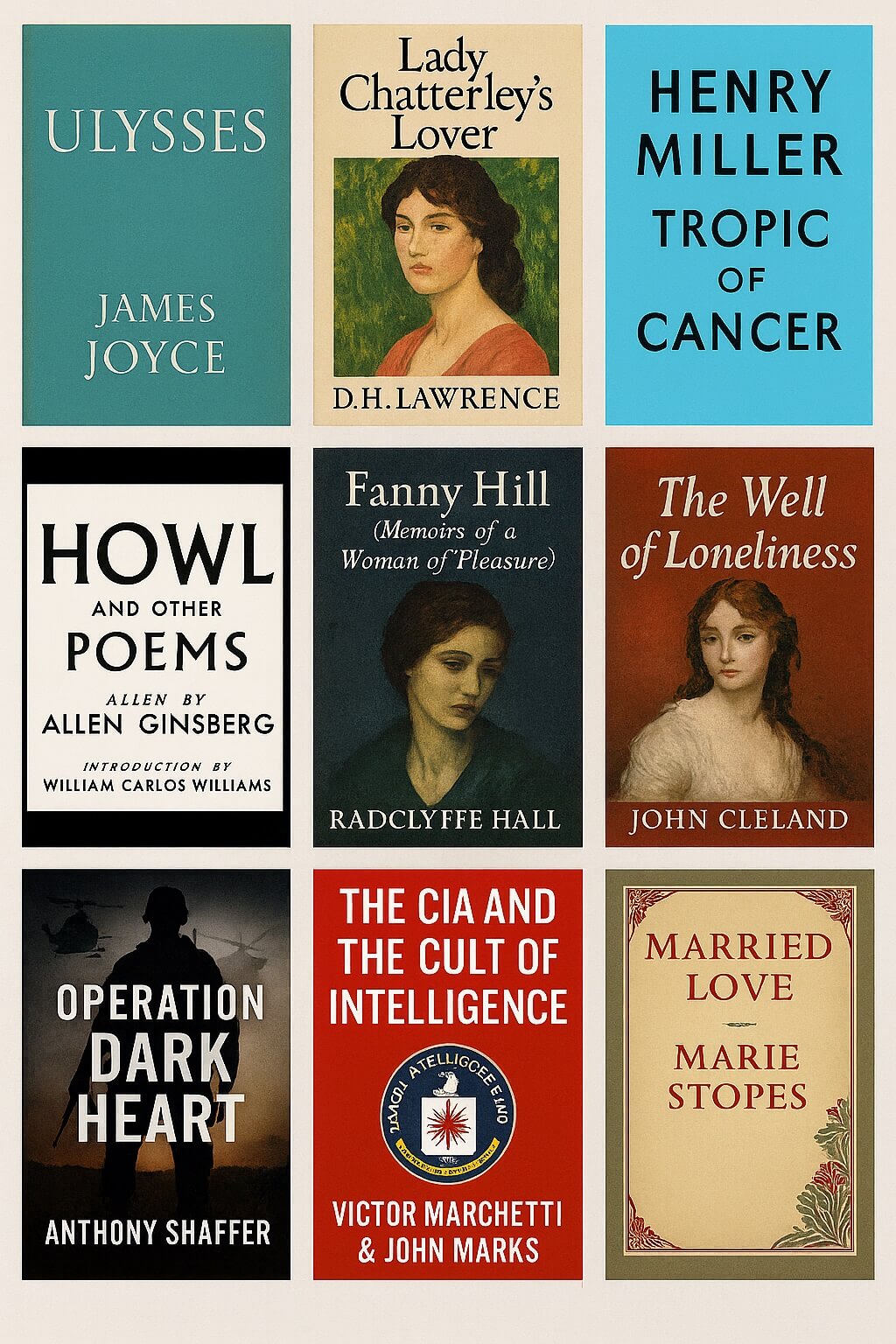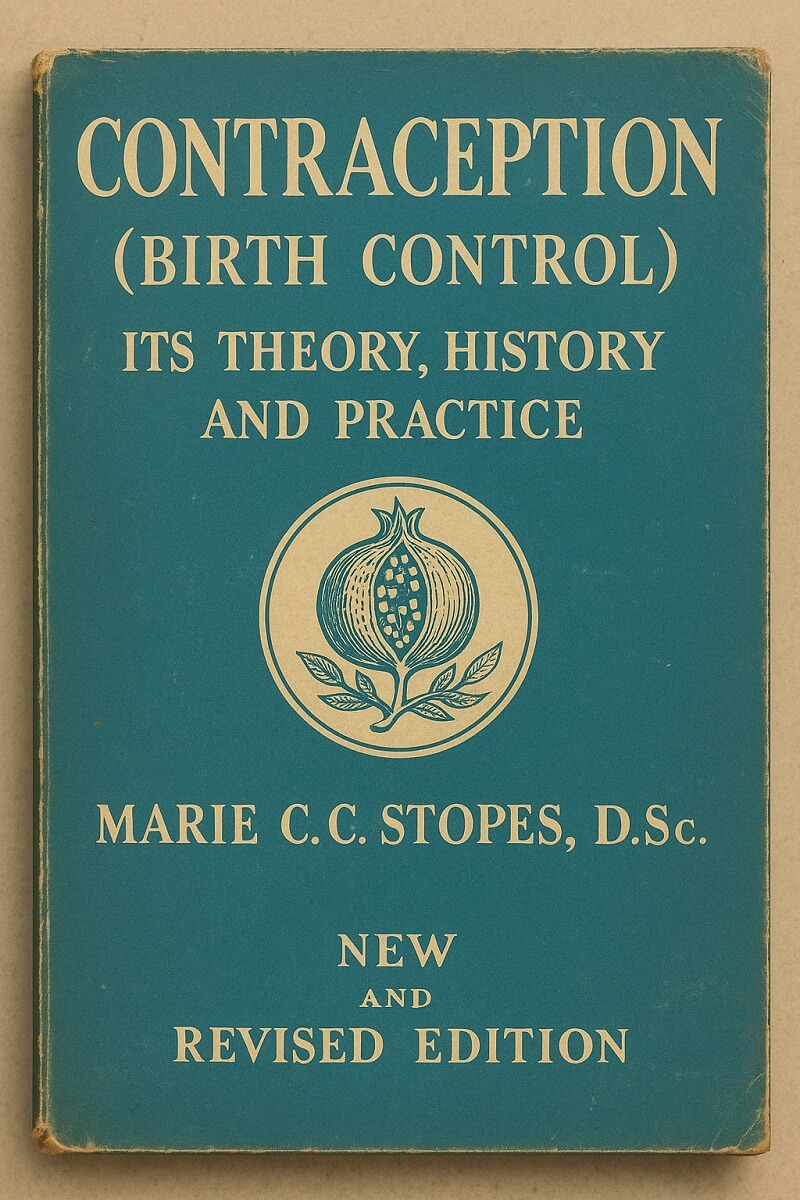
10 Popular Books the U.S. Government Tried to Stop — What the Record Shows
Federal “book bans” in the United States rarely came as blanket nationwide prohibitions. Most actions were postal non-mailability rulings, Customs seizures at the border, or national-security restraints such as prepublication review.
Courts often narrowed or overturned these actions, which is why many once-targeted books are widely available today.
Why this topic matters
Headlines use “banned” in many ways. A school removal and a federal seizure are not the same thing. Readers benefit from clear language: who acted, under which law, and what the courts decided. That clarity helps teachers, students, librarians, and writers talk about speech limits without confusion.
In my seminars, students start with claims they have seen online, then check primary opinions. The change in understanding is immediate once they see the actual orders and the final rulings.
How Washington blocked books
Comstock-era postal rules (18 U.S.C. §1461)
Congress made “obscene” matter nonmailable, giving postal officials power to detain or exclude works until courts reviewed the decision.
Over time, judges required closer reading and fairer procedures, which trimmed broad administrative discretion.
Customs seizures at the border (19 U.S.C. §1305)
Customs could stop “obscene or immoral” materials as they entered the country and trigger in rem forfeiture suits (cases against the book itself).
The Department of Justice manual and the statute outline how seizures and forfeitures worked. Courts often released scientific or literary titles.
National-security restraints (prepublication review and classification)
Former intelligence and defense personnel must clear manuscripts before publication. Courts have upheld these contracts to prevent disclosure of classified information, which has led to redactions and, at times, destruction of printed copies.
Ten books the U.S. government tried to stop

Each entry lists the agency action and the legal outcome. This list centers on federal actions, not state or local school decisions.
1) Ulysses — James Joyce (1933–34)
Action:
Customs and postal officials kept James Joyce’s novel out of the country under obscenity law.
Outcome:
In United States v. One Book Called Ulysses (1933), Judge John M. Woolsey ruled the book not obscene; the Second Circuit affirmed in 1934, which opened U.S. importation and publication. The opinion stressed reading a work as a whole and weighing its literary purpose.
Why readers still discuss it:
The ruling shifted courts away from judging literature by a few pages alone. Teachers often use this case to show how judicial standards evolve with culture and scholarship.
2) Lady Chatterley’s Lover — D. H. Lawrence (1959)
Action:
The Postmaster General declared the unexpurgated novel nonmailable under §1461.
Outcome:
Grove Press, Inc. v. Christenberry (S.D.N.Y. 1959) lifted the postal ban, finding the book not obscene when read as a whole.
Why it matters for policy classes:
The case shows how agency decisions face prompt judicial review, not long-term blacklists.
3) Tropic of Cancer — Henry Miller (1964)
Action:
Long treated as contraband; after U.S. publication in 1961, litigation spread.
Outcome:
In Grove Press v. Gerstein (1964), the U.S. Supreme Court issued a short per curiam reversal of a Florida judgment, signaling constitutional protection for the novel.
Why the case still appears in syllabi:
It marks a late turn away from broad obscenity findings for adult readers.
4) Fanny Hill (Memoirs of a Woman of Pleasure) — John Cleland (1966)
Action:
A Massachusetts court declared the book obscene.
Outcome:
The U.S. Supreme Court reversed in Memoirs v. Massachusetts (1966), stressing “redeeming social value.” The case narrowed the government’s reach over works with historical and literary significance.
5) Howl and Other Poems — Allen Ginsberg (1957)
Action:
U.S. Customs seized 520 imported copies in San Francisco.
Outcome:
A local obscenity case followed against the publisher; the defense prevailed. The seizure is widely cited in public histories of censorship.
6) The Well of Loneliness — Radclyffe Hall (1929)
Action:
Customs sought to bar importation; the publisher engineered test cases.
Outcome:
The U.S. Customs Court ruled the novel did not contain offensive passages and allowed entry; New York’s Court of Special Sessions cleared it of obscenity charges earlier that year.
Why it matters for social-history courses:
The record shows that depiction of same-sex love did not, by itself, justify an obscenity ban in U.S. courts at that time.
7) The CIA and the Cult of Intelligence — Victor Marchetti & John Marks (1972–75)
Action:
The manuscript faced CIA prepublication review and heavy redactions.
Outcome:
Courts upheld enforcement of secrecy agreements against former officials in United States v. Marchetti (4th Cir. 1972) and related rulings; the published book famously displayed blank spaces where text had been removed.
Teaching note:
This line of cases differs from obscenity law. The legal basis is contract and classification, not moral content.
8) Operation Dark Heart — Anthony Shaffer (2010)
Action:
After initial clearance and advance distribution, the Department of Defense purchased and destroyed about 9,500 first-printing copies, then issued a redacted edition.
Outcome:
Newsrooms and watchdogs documented the pulping and the later release, making this a modern example of federal suppression grounded in classification claims.
9) Married Love — Marie Stopes (1931)
Action:
A federal in rem forfeiture case sought to block imports under 19 U.S.C. §1305.
Outcome:
Judge Woolsey dismissed the libel in United States v. One Obscene Book Entitled “Married Love” (S.D.N.Y. 1931), allowing importation of the medical text.
10) Contraception — Marie Stopes (1931)
Action:
Customs again moved to forfeit an imported medical text.
Outcome:
In United States v. One Book, Entitled “Contraception” (S.D.N.Y. 1931), Judge Woolsey held the book not obscene and denied forfeiture.

What the law changed
Reading the work “as a whole”
The Ulysses decision redirected courts away from hunting for offending lines and toward evaluation of a book’s overall character and purpose. That approach set the stage for later victories for adult literature.
Social value and literary merit
Memoirs and the Tropic of Cancer reversal underscored the role of social value and serious purpose when judging sexual content. These rulings limited the reach of obscenity law for adults.
Procedural guardrails
The Justice Manual’s treatment of import seizures, plus statutory timelines, helped keep cases moving rather than letting seizures sit without review.
A separate track for secrets
Prepublication review remains enforceable against former officials. Courts treat this as a bargain attached to access to secrets, not a moral code for the public at large.
How to read “banned” claims with care
-
Name the actor and law. Was it Postal Service (§1461), Customs (§1305), or DoD/CIA through classification? That single step clears up most confusion.
-
Check the timeline. Look for the initial agency action and the final court ruling. Many “bans” ended with orders favoring publication.
-
Separate adult access from school policy. Federal obscenity rulings concern adult access. School decisions run through local processes and different tests.
In workshops, I ask students to pick one title from the list, print the opinion, and highlight: the statute, the standard, and the remedy. The exercise turns slogans into reading skills and helps students write more careful summaries.
Research notes: evidence and context
-
Comstock and the mails. The Comstock Law restricted mailing “obscene” materials and later amendments preserved the non-mailability of such matter.
-
Customs and imports. 19 U.S.C. §1305 banned import of obscene or immoral items and allowed forfeiture proceedings, with deadlines and U.S. Attorney involvement.
-
Ulysses. Trial opinion (1933) and appellate affirmation (1934) form the backbone for modern literary analysis in obscenity cases.
-
Lady Chatterley’s Lover. Federal district court lifted the postal ban in 1959.
-
Tropic of Cancer. Supreme Court reversal in 1964; companion to Jacobellis decisions.
-
Fanny Hill. Supreme Court reversal in 1966 set an important limit on obscenity bans.
-
Howl. Customs seized 520 copies; the episode and acquittal entered free-speech lore.
-
Well of Loneliness. U.S. Customs Court allowed entry; New York court cleared the book after reading it in full.
-
Marchetti / secrecy agreements. Courts enforced prepublication review against a former CIA officer.
-
Operation Dark Heart. DoD paid to destroy first print run and issued a redacted edition.
-
Stopes medical texts. Married Love and Contraception survived customs actions in 1931.
Practical advice for educators and writers
Teach with primary sources
Pick one case and read the order itself. Ask students to trace the path from seizure to judgment. This habit builds media literacy and reduces confusion when a headline uses the word “ban.”
Use precise labels in class and copy
-
“Non-mailable ruling” for postal cases.
-
“Import seizure” for customs cases.
-
“Redacted release” or “prepublication restraint” for national-security disputes.
Context for readers
Add a one-line date + law + outcome box to lesson notes or articles. Example: “Ulysses (1933–34) — Customs/postal obscenity; federal court says not obscene; import/publication allowed.”
Case snapshots for quick study
Obscenity track (mails and imports)
-
Ulysses (1933–34): Not obscene; import allowed.
-
Lady Chatterley’s Lover (1959): Postal ban removed.
-
Tropic of Cancer (1964): Florida ruling reversed by the Supreme Court.
-
Fanny Hill (1966): Supreme Court reversal; social value matters.
-
Howl (1957): Customs seizure failed to stop circulation after trial win.
-
The Well of Loneliness (1929): Customs Court allowed import; New York court cleared it.
-
Stopes titles (1931): Married Love and Contraception survived forfeiture bids.
National-security track
-
The CIA and the Cult of Intelligence (1970s): Redactions enforced under prepublication review.
-
Operation Dark Heart (2010): First print run destroyed; redacted edition released.
Personal note from the classroom
During a censorship unit, I bring two clippings on Howl and Ulysses and ask students to guess the outcomes. Most students expect lifetime bans.
Then they read the actual opinions. The moment they see which law was used and how a judge explained the standard, the conversation changes from outrage to analysis.
They begin to ask better questions: “Was the work read in full?” “What evidence did the agency offer?” That shift is the goal.
Final Thought
Federal “book bans” in the U.S. usually meant a postal decision, a Customs seizure, or a classification dispute, not a permanent nationwide bar for adult readers. C
ourts asked whether the book had serious value, whether it was read as a whole, and whether the government followed procedures. With that lens, readers can evaluate fresh “banned” headlines with less heat and more light.
FAQs
1) Did the federal government ever ban Ulysses outright for adult readers?
No. Customs and postal authorities blocked it for years, then Judge Woolsey ruled it not obscene in 1933, and the Second Circuit affirmed in 1934.
2) Was Tropic of Cancer cleared by the Supreme Court?
Yes. Grove Press v. Gerstein (1964) reversed a Florida ruling against the book.
3) Did U.S. Customs really seize Howl?
Yes. Officials confiscated 520 imported copies in 1957; the publisher later won in court.
4) Do prepublication rules still affect books by former officials?
Yes. Courts have upheld those agreements to protect classified material, which is why some titles carry redactions.
5) Where can I read the original opinions?
See Justia for Ulysses, Grove Press v. Christenberry, Memoirs v. Massachusetts, and the Supreme Court PDF for Grove Press v. Gerstein.
Must Read Books

